Solving Staff Allocation and Scheduling Using ILP at Rydges Hotels
VerifiedAdded on 2021/05/30
|7
|1744
|46
Report
AI Summary
This report focuses on solving staff allocation and scheduling problems for Rydges Hotels in Sydney, Australia, using Integer Linear Programming (ILP). The report begins with an introduction to Rydges Hotels, its competitors, and the challenges of managing over 3,000 employees across eleven locations. It emphasizes the need for a mathematically sound approach to ensure smooth operations. The report then defines ILP, explaining its application in optimizing staffing decisions. A business description of Rydges Hotels is provided, highlighting its services, market position, and the influence of social, political, and economic factors. The report details the benefits of using ILP for staff scheduling, including customer satisfaction, cost reduction, and workplace flexibility. The core issue of staff scheduling is explored, emphasizing the complexity of the task and the benefits of using software to support ILP. The report concludes by outlining the steps involved in performing ILP for Rydges and references relevant academic sources. The assignment provides a comprehensive overview of how ILP can be used to address staffing challenges in the hospitality industry.
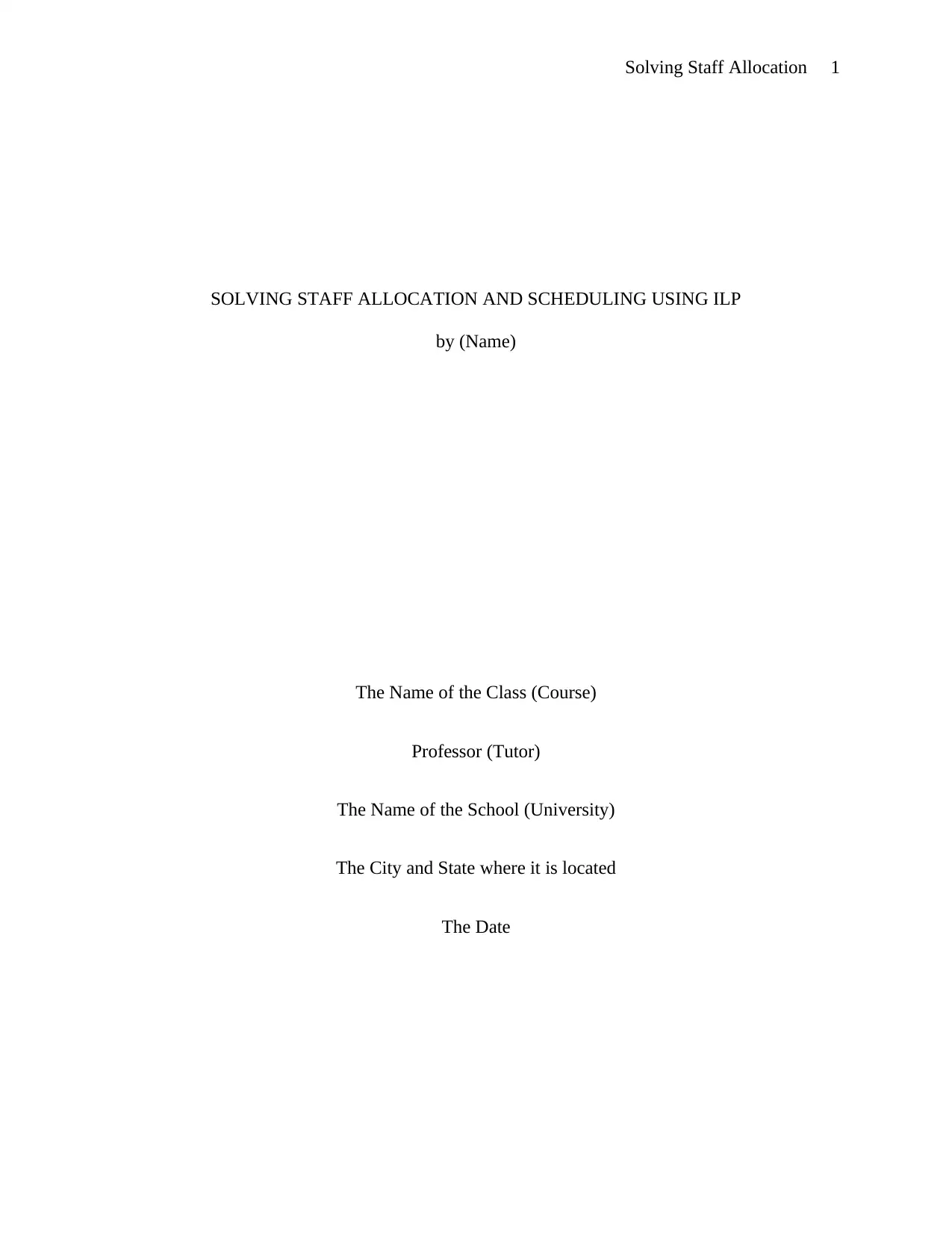
Solving Staff Allocation 1
SOLVING STAFF ALLOCATION AND SCHEDULING USING ILP
by (Name)
The Name of the Class (Course)
Professor (Tutor)
The Name of the School (University)
The City and State where it is located
The Date
SOLVING STAFF ALLOCATION AND SCHEDULING USING ILP
by (Name)
The Name of the Class (Course)
Professor (Tutor)
The Name of the School (University)
The City and State where it is located
The Date
Paraphrase This Document
Need a fresh take? Get an instant paraphrase of this document with our AI Paraphraser
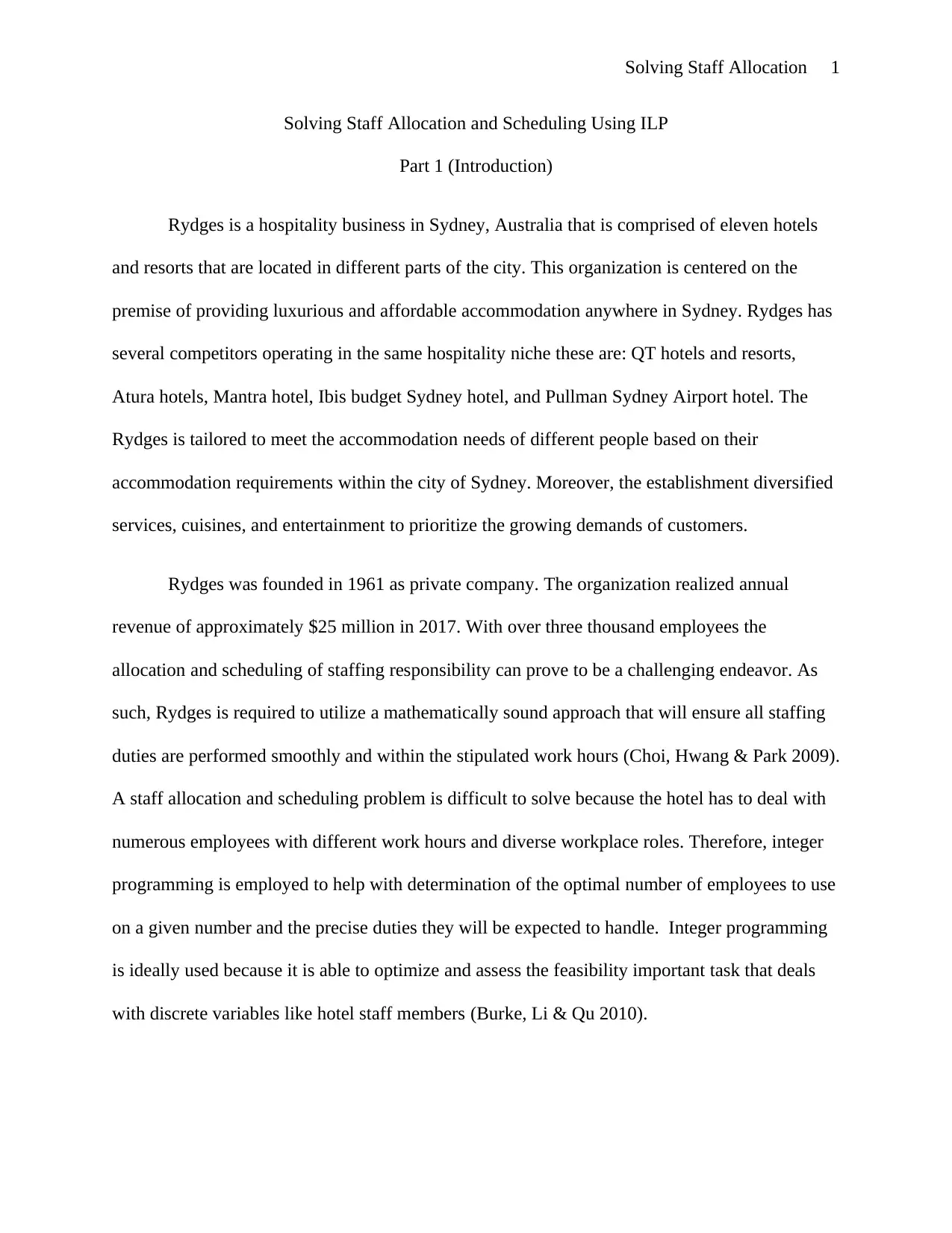
Solving Staff Allocation 1
Solving Staff Allocation and Scheduling Using ILP
Part 1 (Introduction)
Rydges is a hospitality business in Sydney, Australia that is comprised of eleven hotels
and resorts that are located in different parts of the city. This organization is centered on the
premise of providing luxurious and affordable accommodation anywhere in Sydney. Rydges has
several competitors operating in the same hospitality niche these are: QT hotels and resorts,
Atura hotels, Mantra hotel, Ibis budget Sydney hotel, and Pullman Sydney Airport hotel. The
Rydges is tailored to meet the accommodation needs of different people based on their
accommodation requirements within the city of Sydney. Moreover, the establishment diversified
services, cuisines, and entertainment to prioritize the growing demands of customers.
Rydges was founded in 1961 as private company. The organization realized annual
revenue of approximately $25 million in 2017. With over three thousand employees the
allocation and scheduling of staffing responsibility can prove to be a challenging endeavor. As
such, Rydges is required to utilize a mathematically sound approach that will ensure all staffing
duties are performed smoothly and within the stipulated work hours (Choi, Hwang & Park 2009).
A staff allocation and scheduling problem is difficult to solve because the hotel has to deal with
numerous employees with different work hours and diverse workplace roles. Therefore, integer
programming is employed to help with determination of the optimal number of employees to use
on a given number and the precise duties they will be expected to handle. Integer programming
is ideally used because it is able to optimize and assess the feasibility important task that deals
with discrete variables like hotel staff members (Burke, Li & Qu 2010).
Solving Staff Allocation and Scheduling Using ILP
Part 1 (Introduction)
Rydges is a hospitality business in Sydney, Australia that is comprised of eleven hotels
and resorts that are located in different parts of the city. This organization is centered on the
premise of providing luxurious and affordable accommodation anywhere in Sydney. Rydges has
several competitors operating in the same hospitality niche these are: QT hotels and resorts,
Atura hotels, Mantra hotel, Ibis budget Sydney hotel, and Pullman Sydney Airport hotel. The
Rydges is tailored to meet the accommodation needs of different people based on their
accommodation requirements within the city of Sydney. Moreover, the establishment diversified
services, cuisines, and entertainment to prioritize the growing demands of customers.
Rydges was founded in 1961 as private company. The organization realized annual
revenue of approximately $25 million in 2017. With over three thousand employees the
allocation and scheduling of staffing responsibility can prove to be a challenging endeavor. As
such, Rydges is required to utilize a mathematically sound approach that will ensure all staffing
duties are performed smoothly and within the stipulated work hours (Choi, Hwang & Park 2009).
A staff allocation and scheduling problem is difficult to solve because the hotel has to deal with
numerous employees with different work hours and diverse workplace roles. Therefore, integer
programming is employed to help with determination of the optimal number of employees to use
on a given number and the precise duties they will be expected to handle. Integer programming
is ideally used because it is able to optimize and assess the feasibility important task that deals
with discrete variables like hotel staff members (Burke, Li & Qu 2010).
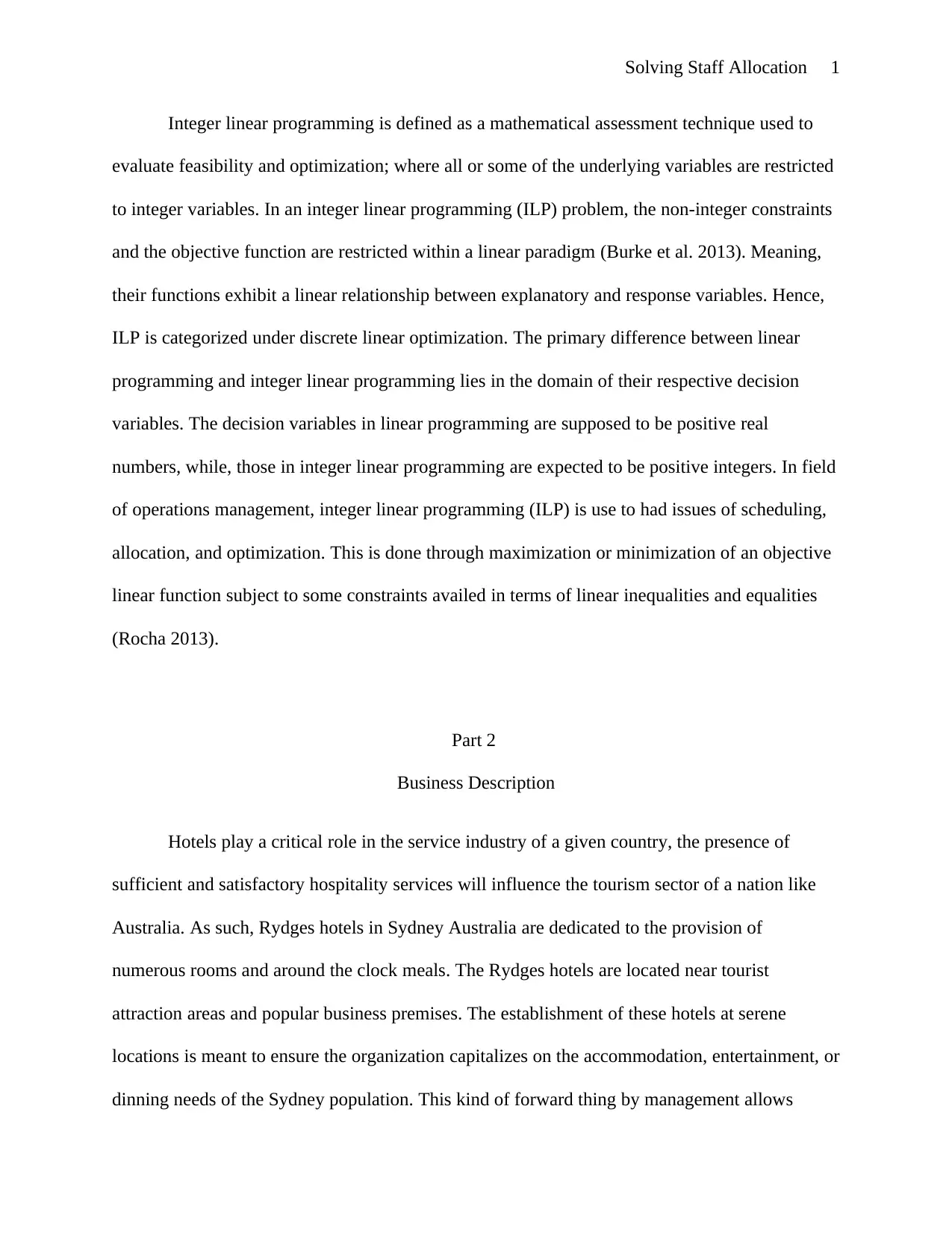
Solving Staff Allocation 1
Integer linear programming is defined as a mathematical assessment technique used to
evaluate feasibility and optimization; where all or some of the underlying variables are restricted
to integer variables. In an integer linear programming (ILP) problem, the non-integer constraints
and the objective function are restricted within a linear paradigm (Burke et al. 2013). Meaning,
their functions exhibit a linear relationship between explanatory and response variables. Hence,
ILP is categorized under discrete linear optimization. The primary difference between linear
programming and integer linear programming lies in the domain of their respective decision
variables. The decision variables in linear programming are supposed to be positive real
numbers, while, those in integer linear programming are expected to be positive integers. In field
of operations management, integer linear programming (ILP) is use to had issues of scheduling,
allocation, and optimization. This is done through maximization or minimization of an objective
linear function subject to some constraints availed in terms of linear inequalities and equalities
(Rocha 2013).
Part 2
Business Description
Hotels play a critical role in the service industry of a given country, the presence of
sufficient and satisfactory hospitality services will influence the tourism sector of a nation like
Australia. As such, Rydges hotels in Sydney Australia are dedicated to the provision of
numerous rooms and around the clock meals. The Rydges hotels are located near tourist
attraction areas and popular business premises. The establishment of these hotels at serene
locations is meant to ensure the organization capitalizes on the accommodation, entertainment, or
dinning needs of the Sydney population. This kind of forward thing by management allows
Integer linear programming is defined as a mathematical assessment technique used to
evaluate feasibility and optimization; where all or some of the underlying variables are restricted
to integer variables. In an integer linear programming (ILP) problem, the non-integer constraints
and the objective function are restricted within a linear paradigm (Burke et al. 2013). Meaning,
their functions exhibit a linear relationship between explanatory and response variables. Hence,
ILP is categorized under discrete linear optimization. The primary difference between linear
programming and integer linear programming lies in the domain of their respective decision
variables. The decision variables in linear programming are supposed to be positive real
numbers, while, those in integer linear programming are expected to be positive integers. In field
of operations management, integer linear programming (ILP) is use to had issues of scheduling,
allocation, and optimization. This is done through maximization or minimization of an objective
linear function subject to some constraints availed in terms of linear inequalities and equalities
(Rocha 2013).
Part 2
Business Description
Hotels play a critical role in the service industry of a given country, the presence of
sufficient and satisfactory hospitality services will influence the tourism sector of a nation like
Australia. As such, Rydges hotels in Sydney Australia are dedicated to the provision of
numerous rooms and around the clock meals. The Rydges hotels are located near tourist
attraction areas and popular business premises. The establishment of these hotels at serene
locations is meant to ensure the organization capitalizes on the accommodation, entertainment, or
dinning needs of the Sydney population. This kind of forward thing by management allows
⊘ This is a preview!⊘
Do you want full access?
Subscribe today to unlock all pages.

Trusted by 1+ million students worldwide
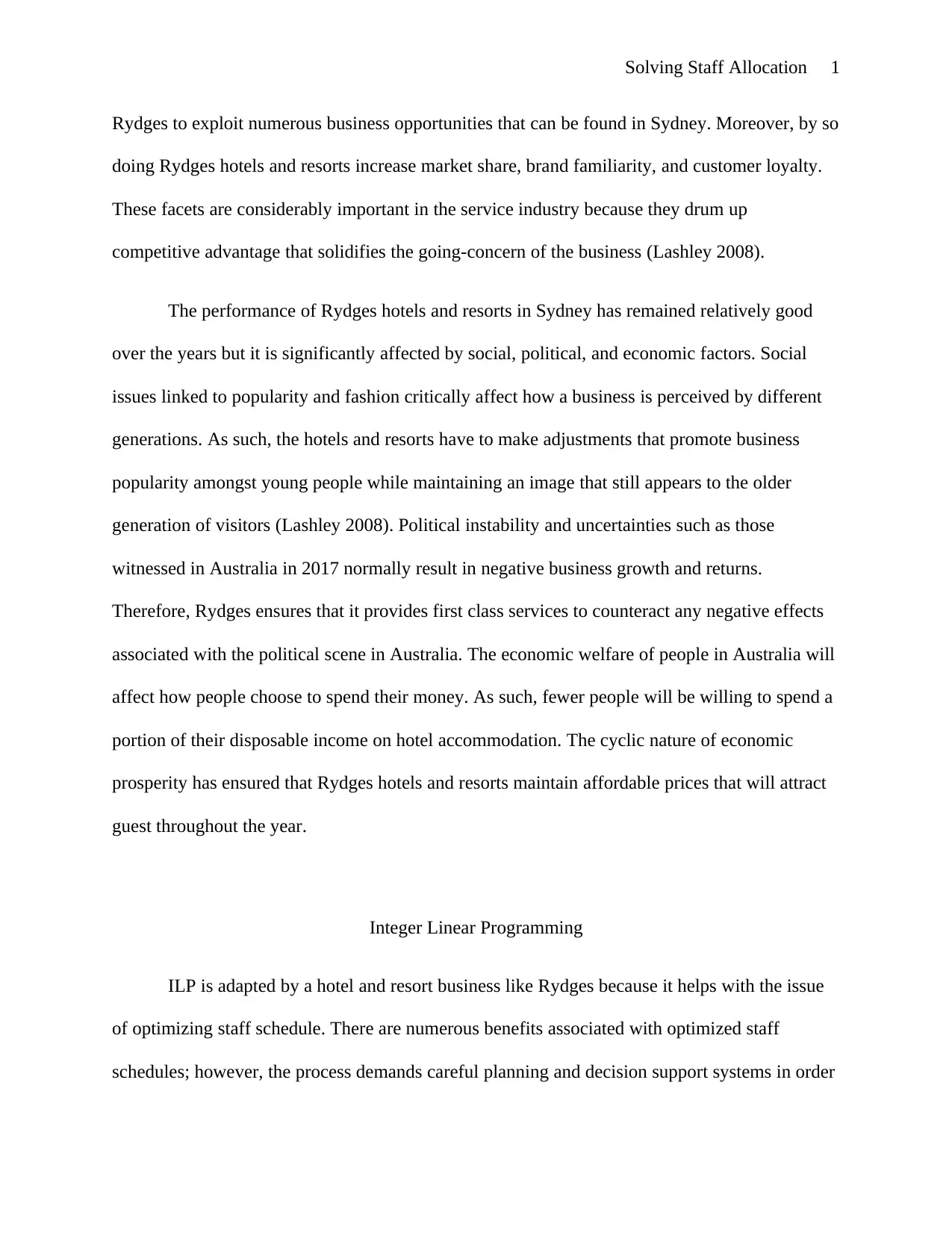
Solving Staff Allocation 1
Rydges to exploit numerous business opportunities that can be found in Sydney. Moreover, by so
doing Rydges hotels and resorts increase market share, brand familiarity, and customer loyalty.
These facets are considerably important in the service industry because they drum up
competitive advantage that solidifies the going-concern of the business (Lashley 2008).
The performance of Rydges hotels and resorts in Sydney has remained relatively good
over the years but it is significantly affected by social, political, and economic factors. Social
issues linked to popularity and fashion critically affect how a business is perceived by different
generations. As such, the hotels and resorts have to make adjustments that promote business
popularity amongst young people while maintaining an image that still appears to the older
generation of visitors (Lashley 2008). Political instability and uncertainties such as those
witnessed in Australia in 2017 normally result in negative business growth and returns.
Therefore, Rydges ensures that it provides first class services to counteract any negative effects
associated with the political scene in Australia. The economic welfare of people in Australia will
affect how people choose to spend their money. As such, fewer people will be willing to spend a
portion of their disposable income on hotel accommodation. The cyclic nature of economic
prosperity has ensured that Rydges hotels and resorts maintain affordable prices that will attract
guest throughout the year.
Integer Linear Programming
ILP is adapted by a hotel and resort business like Rydges because it helps with the issue
of optimizing staff schedule. There are numerous benefits associated with optimized staff
schedules; however, the process demands careful planning and decision support systems in order
Rydges to exploit numerous business opportunities that can be found in Sydney. Moreover, by so
doing Rydges hotels and resorts increase market share, brand familiarity, and customer loyalty.
These facets are considerably important in the service industry because they drum up
competitive advantage that solidifies the going-concern of the business (Lashley 2008).
The performance of Rydges hotels and resorts in Sydney has remained relatively good
over the years but it is significantly affected by social, political, and economic factors. Social
issues linked to popularity and fashion critically affect how a business is perceived by different
generations. As such, the hotels and resorts have to make adjustments that promote business
popularity amongst young people while maintaining an image that still appears to the older
generation of visitors (Lashley 2008). Political instability and uncertainties such as those
witnessed in Australia in 2017 normally result in negative business growth and returns.
Therefore, Rydges ensures that it provides first class services to counteract any negative effects
associated with the political scene in Australia. The economic welfare of people in Australia will
affect how people choose to spend their money. As such, fewer people will be willing to spend a
portion of their disposable income on hotel accommodation. The cyclic nature of economic
prosperity has ensured that Rydges hotels and resorts maintain affordable prices that will attract
guest throughout the year.
Integer Linear Programming
ILP is adapted by a hotel and resort business like Rydges because it helps with the issue
of optimizing staff schedule. There are numerous benefits associated with optimized staff
schedules; however, the process demands careful planning and decision support systems in order
Paraphrase This Document
Need a fresh take? Get an instant paraphrase of this document with our AI Paraphraser
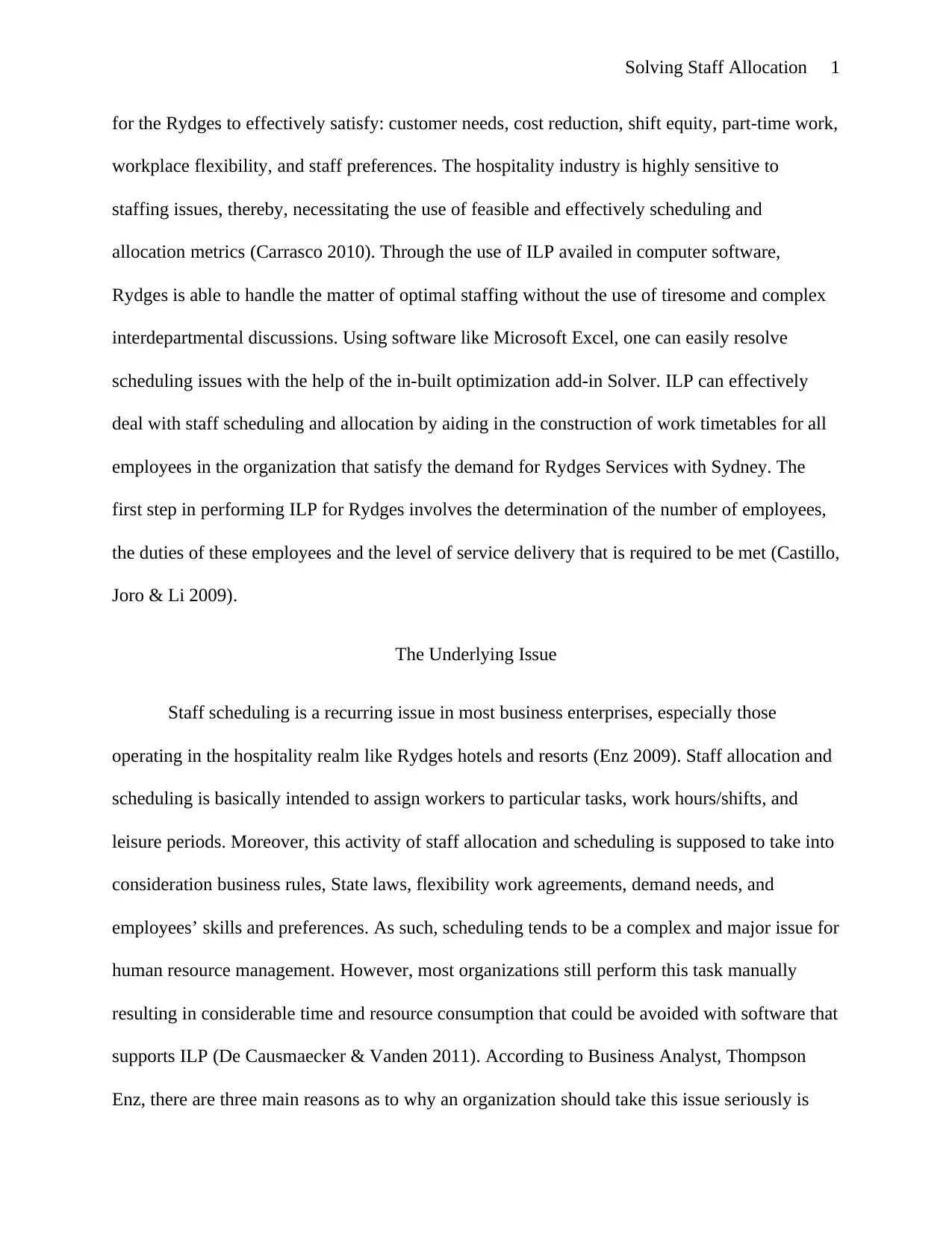
Solving Staff Allocation 1
for the Rydges to effectively satisfy: customer needs, cost reduction, shift equity, part-time work,
workplace flexibility, and staff preferences. The hospitality industry is highly sensitive to
staffing issues, thereby, necessitating the use of feasible and effectively scheduling and
allocation metrics (Carrasco 2010). Through the use of ILP availed in computer software,
Rydges is able to handle the matter of optimal staffing without the use of tiresome and complex
interdepartmental discussions. Using software like Microsoft Excel, one can easily resolve
scheduling issues with the help of the in-built optimization add-in Solver. ILP can effectively
deal with staff scheduling and allocation by aiding in the construction of work timetables for all
employees in the organization that satisfy the demand for Rydges Services with Sydney. The
first step in performing ILP for Rydges involves the determination of the number of employees,
the duties of these employees and the level of service delivery that is required to be met (Castillo,
Joro & Li 2009).
The Underlying Issue
Staff scheduling is a recurring issue in most business enterprises, especially those
operating in the hospitality realm like Rydges hotels and resorts (Enz 2009). Staff allocation and
scheduling is basically intended to assign workers to particular tasks, work hours/shifts, and
leisure periods. Moreover, this activity of staff allocation and scheduling is supposed to take into
consideration business rules, State laws, flexibility work agreements, demand needs, and
employees’ skills and preferences. As such, scheduling tends to be a complex and major issue for
human resource management. However, most organizations still perform this task manually
resulting in considerable time and resource consumption that could be avoided with software that
supports ILP (De Causmaecker & Vanden 2011). According to Business Analyst, Thompson
Enz, there are three main reasons as to why an organization should take this issue seriously is
for the Rydges to effectively satisfy: customer needs, cost reduction, shift equity, part-time work,
workplace flexibility, and staff preferences. The hospitality industry is highly sensitive to
staffing issues, thereby, necessitating the use of feasible and effectively scheduling and
allocation metrics (Carrasco 2010). Through the use of ILP availed in computer software,
Rydges is able to handle the matter of optimal staffing without the use of tiresome and complex
interdepartmental discussions. Using software like Microsoft Excel, one can easily resolve
scheduling issues with the help of the in-built optimization add-in Solver. ILP can effectively
deal with staff scheduling and allocation by aiding in the construction of work timetables for all
employees in the organization that satisfy the demand for Rydges Services with Sydney. The
first step in performing ILP for Rydges involves the determination of the number of employees,
the duties of these employees and the level of service delivery that is required to be met (Castillo,
Joro & Li 2009).
The Underlying Issue
Staff scheduling is a recurring issue in most business enterprises, especially those
operating in the hospitality realm like Rydges hotels and resorts (Enz 2009). Staff allocation and
scheduling is basically intended to assign workers to particular tasks, work hours/shifts, and
leisure periods. Moreover, this activity of staff allocation and scheduling is supposed to take into
consideration business rules, State laws, flexibility work agreements, demand needs, and
employees’ skills and preferences. As such, scheduling tends to be a complex and major issue for
human resource management. However, most organizations still perform this task manually
resulting in considerable time and resource consumption that could be avoided with software that
supports ILP (De Causmaecker & Vanden 2011). According to Business Analyst, Thompson
Enz, there are three main reasons as to why an organization should take this issue seriously is
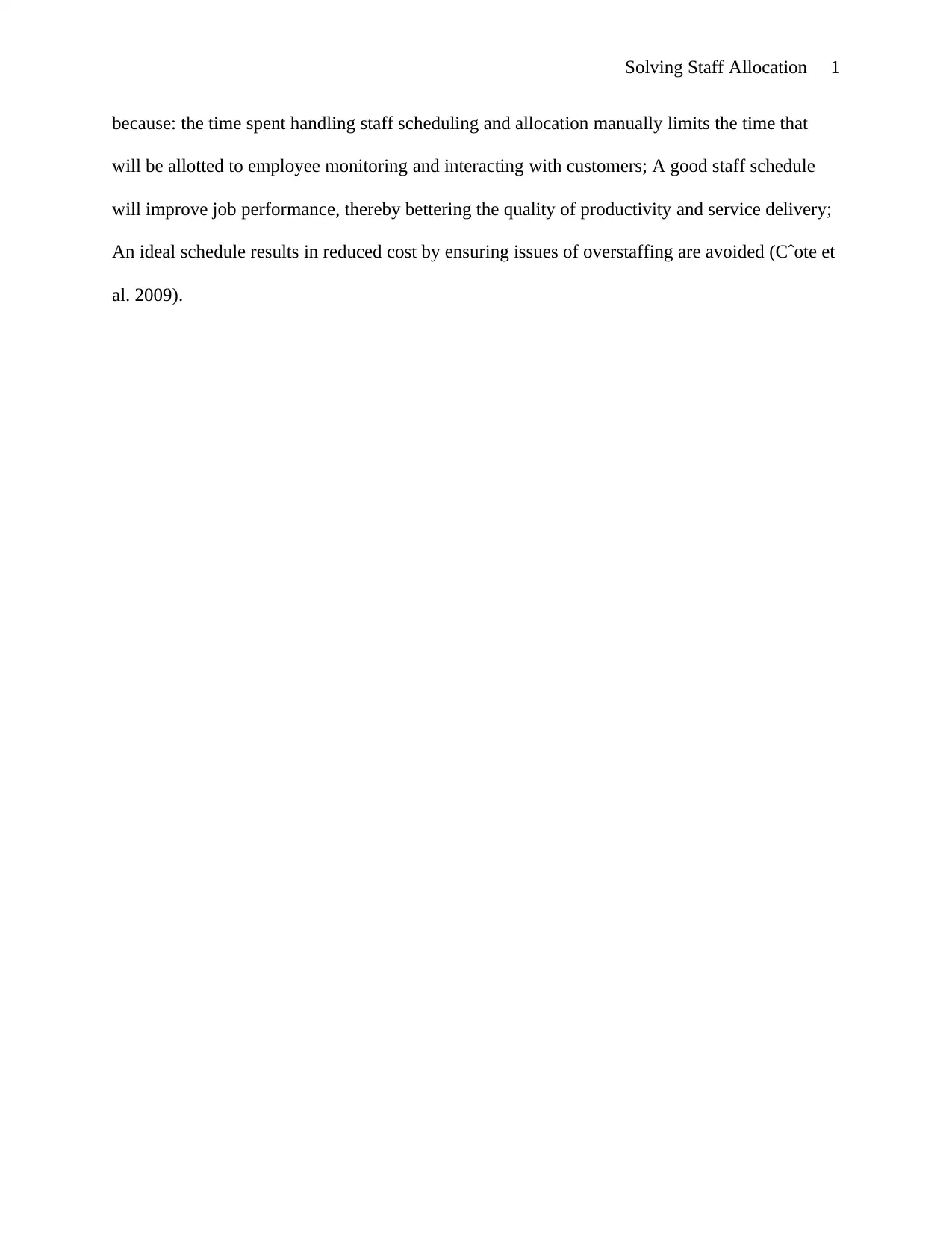
Solving Staff Allocation 1
because: the time spent handling staff scheduling and allocation manually limits the time that
will be allotted to employee monitoring and interacting with customers; A good staff schedule
will improve job performance, thereby bettering the quality of productivity and service delivery;
An ideal schedule results in reduced cost by ensuring issues of overstaffing are avoided (Cˆote et
al. 2009).
because: the time spent handling staff scheduling and allocation manually limits the time that
will be allotted to employee monitoring and interacting with customers; A good staff schedule
will improve job performance, thereby bettering the quality of productivity and service delivery;
An ideal schedule results in reduced cost by ensuring issues of overstaffing are avoided (Cˆote et
al. 2009).
⊘ This is a preview!⊘
Do you want full access?
Subscribe today to unlock all pages.

Trusted by 1+ million students worldwide
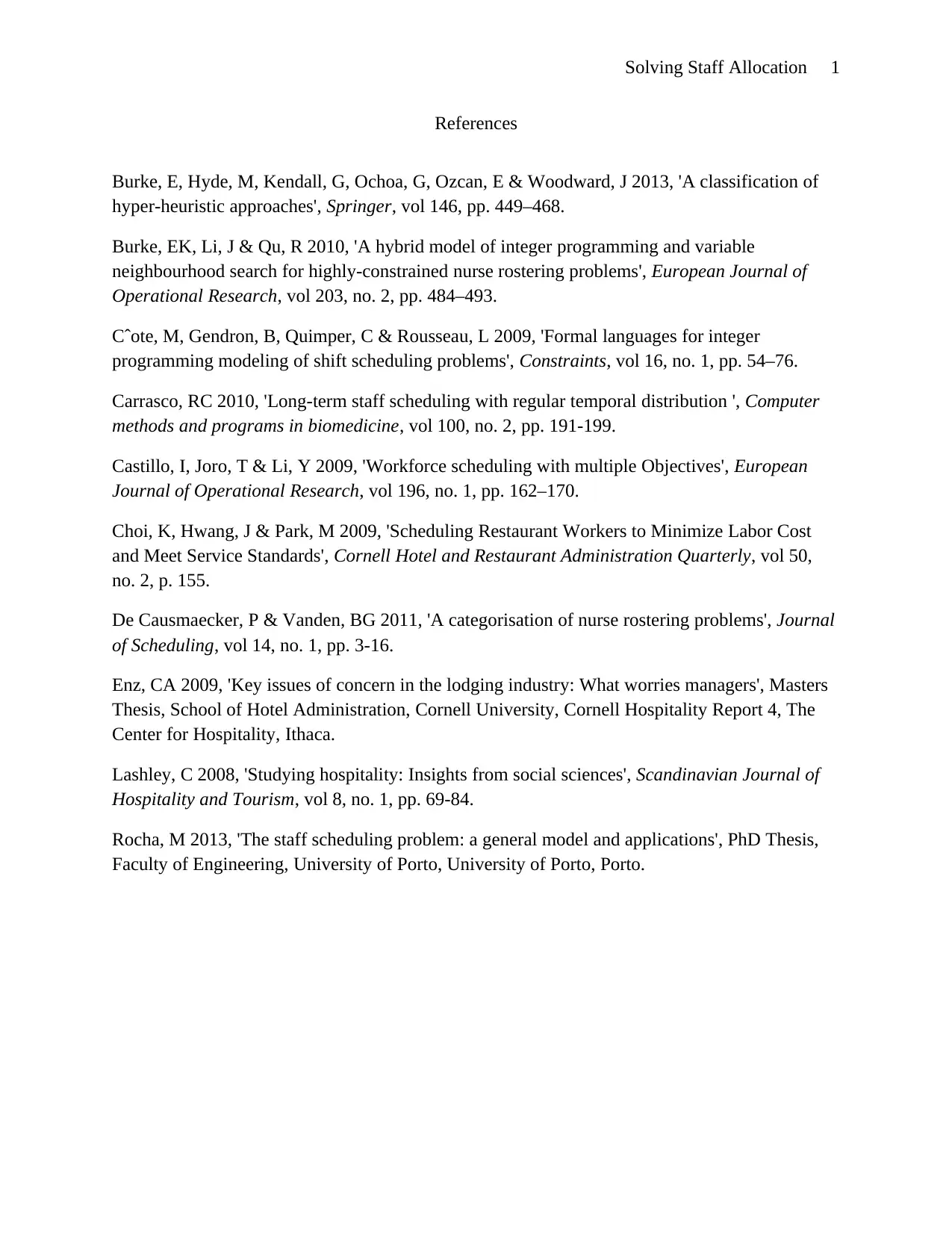
Solving Staff Allocation 1
References
Burke, E, Hyde, M, Kendall, G, Ochoa, G, Ozcan, E & Woodward, J 2013, 'A classification of
hyper-heuristic approaches', Springer, vol 146, pp. 449–468.
Burke, EK, Li, J & Qu, R 2010, 'A hybrid model of integer programming and variable
neighbourhood search for highly-constrained nurse rostering problems', European Journal of
Operational Research, vol 203, no. 2, pp. 484–493.
Cˆote, M, Gendron, B, Quimper, C & Rousseau, L 2009, 'Formal languages for integer
programming modeling of shift scheduling problems', Constraints, vol 16, no. 1, pp. 54–76.
Carrasco, RC 2010, 'Long-term staff scheduling with regular temporal distribution ', Computer
methods and programs in biomedicine, vol 100, no. 2, pp. 191-199.
Castillo, I, Joro, T & Li, Y 2009, 'Workforce scheduling with multiple Objectives', European
Journal of Operational Research, vol 196, no. 1, pp. 162–170.
Choi, K, Hwang, J & Park, M 2009, 'Scheduling Restaurant Workers to Minimize Labor Cost
and Meet Service Standards', Cornell Hotel and Restaurant Administration Quarterly, vol 50,
no. 2, p. 155.
De Causmaecker, P & Vanden, BG 2011, 'A categorisation of nurse rostering problems', Journal
of Scheduling, vol 14, no. 1, pp. 3-16.
Enz, CA 2009, 'Key issues of concern in the lodging industry: What worries managers', Masters
Thesis, School of Hotel Administration, Cornell University, Cornell Hospitality Report 4, The
Center for Hospitality, Ithaca.
Lashley, C 2008, 'Studying hospitality: Insights from social sciences', Scandinavian Journal of
Hospitality and Tourism, vol 8, no. 1, pp. 69-84.
Rocha, M 2013, 'The staff scheduling problem: a general model and applications', PhD Thesis,
Faculty of Engineering, University of Porto, University of Porto, Porto.
References
Burke, E, Hyde, M, Kendall, G, Ochoa, G, Ozcan, E & Woodward, J 2013, 'A classification of
hyper-heuristic approaches', Springer, vol 146, pp. 449–468.
Burke, EK, Li, J & Qu, R 2010, 'A hybrid model of integer programming and variable
neighbourhood search for highly-constrained nurse rostering problems', European Journal of
Operational Research, vol 203, no. 2, pp. 484–493.
Cˆote, M, Gendron, B, Quimper, C & Rousseau, L 2009, 'Formal languages for integer
programming modeling of shift scheduling problems', Constraints, vol 16, no. 1, pp. 54–76.
Carrasco, RC 2010, 'Long-term staff scheduling with regular temporal distribution ', Computer
methods and programs in biomedicine, vol 100, no. 2, pp. 191-199.
Castillo, I, Joro, T & Li, Y 2009, 'Workforce scheduling with multiple Objectives', European
Journal of Operational Research, vol 196, no. 1, pp. 162–170.
Choi, K, Hwang, J & Park, M 2009, 'Scheduling Restaurant Workers to Minimize Labor Cost
and Meet Service Standards', Cornell Hotel and Restaurant Administration Quarterly, vol 50,
no. 2, p. 155.
De Causmaecker, P & Vanden, BG 2011, 'A categorisation of nurse rostering problems', Journal
of Scheduling, vol 14, no. 1, pp. 3-16.
Enz, CA 2009, 'Key issues of concern in the lodging industry: What worries managers', Masters
Thesis, School of Hotel Administration, Cornell University, Cornell Hospitality Report 4, The
Center for Hospitality, Ithaca.
Lashley, C 2008, 'Studying hospitality: Insights from social sciences', Scandinavian Journal of
Hospitality and Tourism, vol 8, no. 1, pp. 69-84.
Rocha, M 2013, 'The staff scheduling problem: a general model and applications', PhD Thesis,
Faculty of Engineering, University of Porto, University of Porto, Porto.
1 out of 7
Your All-in-One AI-Powered Toolkit for Academic Success.
+13062052269
info@desklib.com
Available 24*7 on WhatsApp / Email
![[object Object]](/_next/static/media/star-bottom.7253800d.svg)
Unlock your academic potential
Copyright © 2020–2026 A2Z Services. All Rights Reserved. Developed and managed by ZUCOL.

